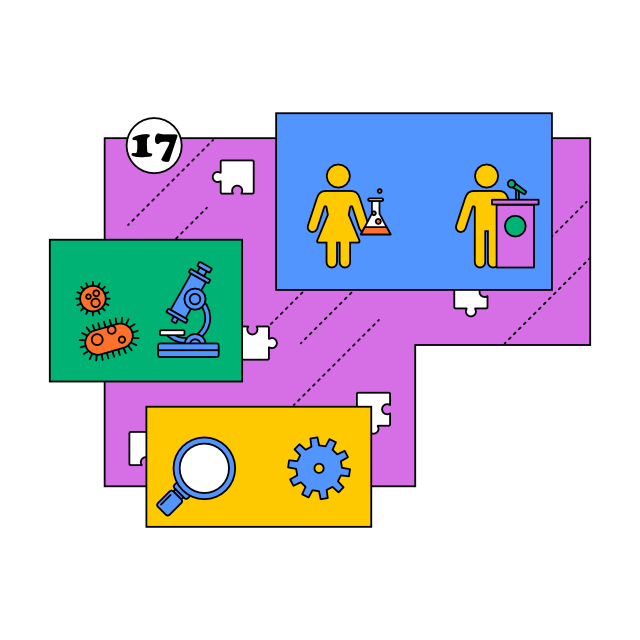SDG 17Partnerships for the Goals
Global cooperation in science, new technology development, and access to innovation
Overview
The final Sustainable Development Goal connects all the previous ones. It promotes the idea that to fulfil the goals, global partnership between all countries is required. International cooperation in science enables sharing the latest knowledge, finding the world’s best scientific talent, creating business opportunities for new markets, and strengthening scientific diplomacy. Science, technology, and innovation have the potential to solve global challenges such as hunger, health, climate, food, energy, and water. It is science that can reveal that the demand to double agricultural production can have a negative impact on numerous other areas such as health, climate, and biodiversity. Science can help mediate a compromise between various goals and formulate a dialogue between the executive and the citizens.
Solutions and Key Innovations
The solution to global challenges is directly dependent on knowledge sharing. The interaction between scientists and policy makers is key. We can be inspired by the UK, where the independent Parliamentary Office of Science and Technology has been operating since 1989. It is known particularly for its concise scientific analyses – the POST notes which advise the Members of Parliament on science. The reports cover issues such as the conditions of refugee accommodation in the UK, genome editing, infant mortality, education of juveniles in custody, and protection from domestic violence.
Sometimes, it does not take a community to save millions of patients worldwide, but a single person, such as the Czech scientist Professor Antonín Holý from the Institute of Organic Chemistry and Biochemistry at the Czech Academy of Sciences. As early as the 1980s, he discovered antivirals that treat HIV, hepatitis B and other diseases. Czech science still benefits from the cooperation between Antonín Holý and Erik De Clercq from the American company Gilead Sciences. In 2016, a partnership programme between the Institute of Organic Chemistry and Biochemistry and the Gilead Sciences Research Centre was renewed with an annual contribution of USD 1.35 million to support human disease research.
In addition to public budgets, international donors and foundations are also contributing to funding for science. Foundations such as the Welcome Trust, the Volkswagen Foundation and the Bill and Melinda Gates Foundation provide significant support for research partnerships.
Until 2027, Horizon Europe with a budget of nearly 100 billion EUR for funding international research is available to European science. A new concept is “missions”, i.e., research areas relevant for the majority of European citizens, such as climate change, cancer treatment, oceans, smart cities, soil research, and food production technology.
An example of international cooperation is the African Open Science Platform which is building its own capacity for cutting-edge data-based science.
It is not only science, but the whole of society, that is being shaped by digitalization, the way it changes how we work, communicate, and perceive the world. In 2020, France and Canada initiated The Global Partnership for Artificial Intelligence which currently consists of 25 members from Europe, South America and Asia. The Czech Republic is a member, too, joining in the international political conversation on the impact and standards of artificial intelligence.
The strategic report, The Future Is Now: Science for Achieving Sustainable Development conveys the message that we cannot keep waiting for crises and then search for solutions, but we need to act right now based on our current knowledge and the understanding offered by independent scientific research.
Key Questions
- Can science influence the public discourse towards democracy?
- Are science and diplomacy related?
- Can we prevent the misuse of scientific technology?
- Is science necessary to meet the Sustainable Development Goals?
Key Words
Collaboration, partnership, science, compromise, solutions
